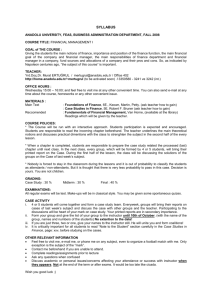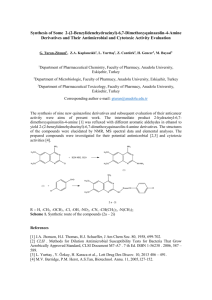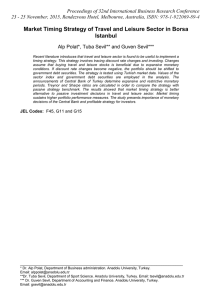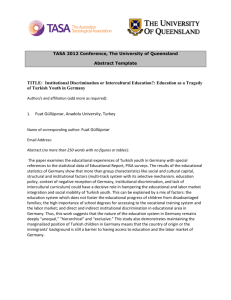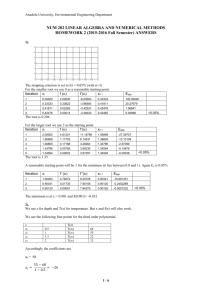ISSN 1302-6488 Volume:5 Number:4 From the Editor I am pleased
advertisement
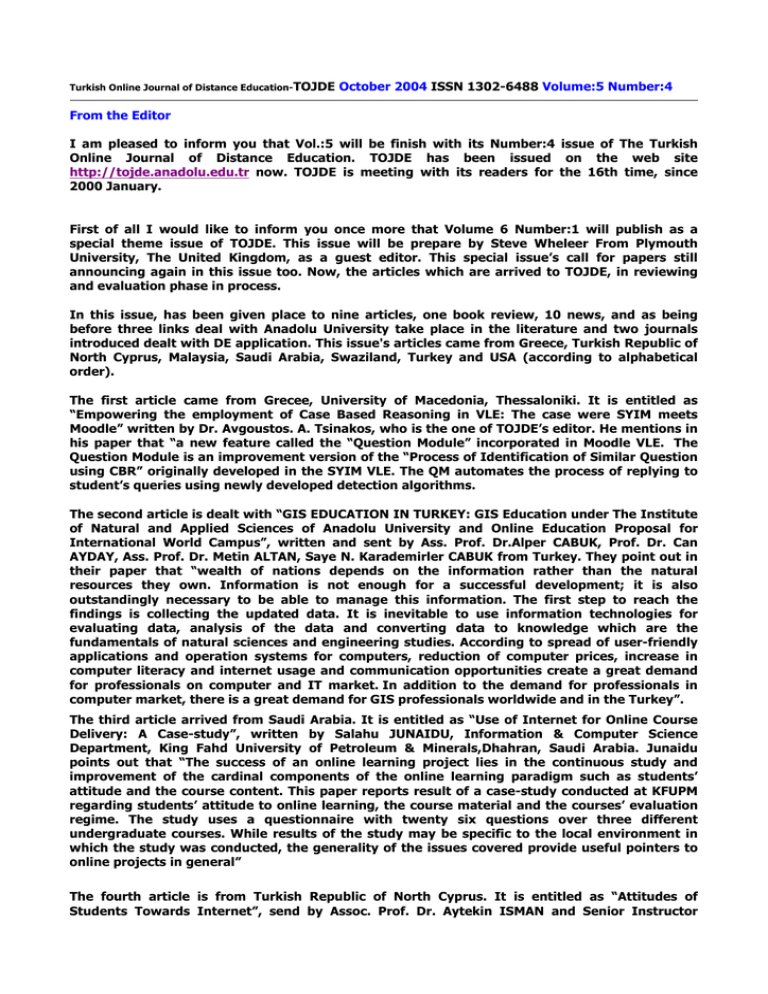
Turkish Online Journal of Distance Education-TOJDE October 2004 ISSN 1302-6488 Volume:5 Number:4 From the Editor I am pleased to inform you that Vol.:5 will be finish with its Number:4 issue of The Turkish Online Journal of Distance Education. TOJDE has been issued on the web site http://tojde.anadolu.edu.tr now. TOJDE is meeting with its readers for the 16th time, since 2000 January. First of all I would like to inform you once more that Volume 6 Number:1 will publish as a special theme issue of TOJDE. This issue will be prepare by Steve Wheleer From Plymouth University, The United Kingdom, as a guest editor. This special issue’s call for papers still announcing again in this issue too. Now, the articles which are arrived to TOJDE, in reviewing and evaluation phase in process. In this issue, has been given place to nine articles, one book review, 10 news, and as being before three links deal with Anadolu University take place in the literature and two journals introduced dealt with DE application. This issue's articles came from Greece, Turkish Republic of North Cyprus, Malaysia, Saudi Arabia, Swaziland, Turkey and USA (according to alphabetical order). The first article came from Grecee, University of Macedonia, Thessaloniki. It is entitled as “Empowering the employment of Case Based Reasoning in VLE: The case were SYIM meets Moodle” written by Dr. Avgoustos. A. Tsinakos, who is the one of TOJDE’s editor. He mentions in his paper that “a new feature called the “Question Module” incorporated in Moodle VLE. The Question Module is an improvement version of the “Process of Identification of Similar Question using CBR” originally developed in the SYIM VLE. The QM automates the process of replying to student’s queries using newly developed detection algorithms. The second article is dealt with “GIS EDUCATION IN TURKEY: GIS Education under The Institute of Natural and Applied Sciences of Anadolu University and Online Education Proposal for International World Campus”, written and sent by Ass. Prof. Dr.Alper CABUK, Prof. Dr. Can AYDAY, Ass. Prof. Dr. Metin ALTAN, Saye N. Karademirler CABUK from Turkey. They point out in their paper that “wealth of nations depends on the information rather than the natural resources they own. Information is not enough for a successful development; it is also outstandingly necessary to be able to manage this information. The first step to reach the findings is collecting the updated data. It is inevitable to use information technologies for evaluating data, analysis of the data and converting data to knowledge which are the fundamentals of natural sciences and engineering studies. According to spread of user-friendly applications and operation systems for computers, reduction of computer prices, increase in computer literacy and internet usage and communication opportunities create a great demand for professionals on computer and IT market. In addition to the demand for professionals in computer market, there is a great demand for GIS professionals worldwide and in the Turkey”. The third article arrived from Saudi Arabia. It is entitled as “Use of Internet for Online Course Delivery: A Case-study”, written by Salahu JUNAIDU, Information & Computer Science Department, King Fahd University of Petroleum & Minerals,Dhahran, Saudi Arabia. Junaidu points out that “The success of an online learning project lies in the continuous study and improvement of the cardinal components of the online learning paradigm such as students’ attitude and the course content. This paper reports result of a case-study conducted at KFUPM regarding students’ attitude to online learning, the course material and the courses’ evaluation regime. The study uses a questionnaire with twenty six questions over three different undergraduate courses. While results of the study may be specific to the local environment in which the study was conducted, the generality of the issues covered provide useful pointers to online projects in general” The fourth article is from Turkish Republic of North Cyprus. It is entitled as “Attitudes of Students Towards Internet”, send by Assoc. Prof. Dr. Aytekin ISMAN and Senior Instructor Fahme DABAJ, Eastern Mediterranean University. They indicate in their paper that “by the developments of technology that is bridge among science and application to supply needs of human beings. Technology affects all aspects and issues in human being’s lives. Especially, it creates competitive trends and global action to people. On the other hand, adaptation to the changes becomes inevitable situation under the perspective of catching competition. Reaching information became the factor of creating easy life by the help of technology. Technological developments open wide range of oppurtunities for people especially in education. Internet is a part of technology in order to catch alternatives on every areas at competitive environment. It provides us to get efficient and fast information, establishing contact with everyone and to have a chance for searching all types of data with its globalization effect”. The fifth article is focused on “Case of Adult Learners and Work Satisfaction: Who’s Behind Them?”, written by Muhammad Hasmi Abu Hassan ASAARI and Noorliza KARIA, from Universiti Sains Malaysia, Malaysia. Their study aims on the work satisfaction of working adult learners in relation to their spouse’s support. It can be concluded that spouse played an important factor in determining the work satisfaction of working adult learners. A group of adult learners was taken as a case study. Result indicated that male adult learners working in the public sector with a support from his fulltime housewife showed a high work satisfaction as compare to the other working groups. The sixth article is again from Turkish Republic of North Cyprus. It is entitled as “Roles of the Students and Teachers in Distance Education”, send by, Assoc. Prof. Dr. Aytekin ISMAN, Research Assistant Zehra ALTINAY and Research Assistant Fahriye ALTINAY, Eastern Mediterranean University. They emphasis in his article that Distance Education is the new, global technology based education to facilitate easy, immediate learning and interaction for all communicators who are the teachers and students that involve the education program. Distance Education can provide wide-mass education for everyone, it leads people to learn individually and let responsibility of learning to the people. In addition to this; it is obvious to select courses and content that reflect the concerning needs and motivation of students. It provides creative and qualified ideas atmosphere and information that will be presented should be update and interesting for all different kinds of students according to their backgrounds information. For the effective distance education programs out of the communicational or any kind of barriers, there should be consciousness on the definable roles of the teachers and students in learning-teaching process. The seventh article is an evaluation of the “Using Mimio Boardcast in an Online Principles of Macroeconomics Course to Improve Student Performance” written by Nikki McIntyre FINLAY and Michael H. DEIS from Clayton College and State University, Morrow, GA-USA They point out that “The emergence of the speedily evolving world of technology has given many universities an interactive medium to facilitate teaching and learning. One such medium has been online courses, which have provided greater access to both traditional and nontraditional students. In quantitative courses such as economics, however, there are often concerns about whether students in online and on-campus sections of the same course receive equivalent educational experiences. This paper will compare student performance, as measured by grades and retention, of students enrolled in economics courses from the fall of 1998 through the summer of 2003. The paper will also focus on how one university has used technology and pedagogy to facilitate teaching and learning, In addition, the paper will show how one professor is effectively using Mimio Boardcast to enhance the quality of education offered to students taking online courses and will describe the methods the professor has used to empower the students to successfully integrate pedagogy, technology, and academic outcomes”. The last and eight article is an evaluation of the “Learner Support Services in Distance Education System (A Case Study of Turkey)”, written by Dr. Salih USUN, Department of Educational Sciences, Canakkale Onsekiz Mart University, CANAKKALE-TURKEY. The aim of this paper is to review learner support services in Turkish distance education system, the Open Education Faculty (OEF) of Anadolu University. The paper examines the Turkish distance education system according to four types of support systems; (1) learner support and learner needs; (2) learner support and content; (3) learner support and the institutional context and, (4) learner support and technology. A number of suggestions are presented in this paper on enhancing learner support in Turkish distance education system and Open Education Faculty (OEF). In this issue given a one book review an done two journal reviews. The book review is about Making Sense of Online Learning: A Guide for Beginners and the Truly Skeptical written by Written by Patti SHANK, Amy SITZE and reviewed by me. The journal is “International Education Journal-IEJ”. IEJ is a freely accessible, full-text, peerreviewed, international online journal that seeks clear and significant contributions that further debate on educational issues. Education is interpreted in a wide manner and includes human development, learning, school education, formal and informal education, tertiary and vocational education, industry training and lifelong learning. We publish articles from teachers, administrators, professors, graduate students, policy-makers, and education specialists from governmental and non-governmental organisations. The second Journal is “The Journal of University Teaching and Learning Practice-JUTLP. It is a bi-annual, peer-reviewed journal publishing papers that add significantly to the body of knowledge describing effective and innovative teaching and learning practice in the higher education environment. The Journal aims to provide a forum for educational practitioners in a wide range of disciplines to communicate their teaching and learning outcomes in a scholarly way. Its purpose is to bridge the gap between journals covering purely academic research and more pragmatic articles and opinions published elsewhere. Some columns in the News section of TOJDE are still keep in this issue too. For example, dealing with some Tojde dealers and readers' feelings and their expressions which had been sent to me. This Column will be carried on the following issues in due to. Since your feelings and expressions are always welcome to the TOJDE's Editorial. We believe that you will do your best expression on your feelings and opinions about TOJDE in due course. Columns which are entitled "Advertising in the TOJDE", "Anadolu University's Articles" and "TOJDE's Links Are Getting More" still kept in this issue. As a new subject, TOJDE's links are increasing day by day in the electronic medium. Three more editors joined to TOJDE's editorial Board in the 16th Issue; Associate Prof. Dr. Associate Professor Alan SMITH University of Southern Queensland, Australia, Associate Professor Patrick Alan DANAHER, Central Queensland. Head, Learning, Evaluation, Innovation and Development (LEID) Centre, Division of Teaching and Learning Services, Central Queensland University, Australia and from the same institution Mr Fons NOUWENS. Last two new editors were guest editors of TOJDE’s latest issue. At the last, TOJDE won Mension of the Association of Learned and Professional Society Publishers 2004 Awards on ALPSP/Charlesworth Award for Best New Journal. Jury is declared about TOJDE that “As always, it has been difficult to select just one or two journals from all the submissions and the judges would like to make special mention of three other publications. In the category of Best New Journal, The Turkish Online Journal of Distance Education-TOJDE, published by Anadolu University, is easy to access and navigate and provides a good example of the online medium used in a simple but effective way. The Association was formed in 1972, and its mission is to serve, represent and strengthen the community of not-for-profit publishers and those who work with them to disseminate academic and professional information. ALPSP believes that this is a time of unprecedented change in the publishing environment. The Association intends to play an active part in shaping the future of academic and professional communication, demonstrating the essential role that its member publishers have to play. ALPSP monitors national and international issues and represents the interests of members to the wider world; it carries out research, and issues occasional position papers and guidelines for good practice. It helps its members, and others, to prepare for the challenges of the future through a programme of education, training and development. It develops collective initiatives, most notably the ALPSP Learned Journals Collection (in partnership with Swets), for the benefit of smaller publishers. There is a full programme of seminars and other meetings on issues of current concern, and a series of training courses. ALPSP also provides information and advice to members, both individually and via e-mail discussion lists. The Association publishes a quarterly journal, Learned Publishing, and an electronic newsletter, ALPSP Alert. As being of Editor-in-Chief of the TOJDE, the first of my many thanks go to the Anadolu University administration team. And than econly, I would like to congrulate all TOJDE’s editorial team and and others who are give their hands to TOJDE as academically, technicall and in any way or as TOJDE fanner. Dear readers, you can reach us online either directly at http://tojde.anadolu.edu.tr or by visiting Anadolu University homepage at http://www.anadolu.edu.tr and go to the 'index' page. To receive further information and to send your recommendations and remarks, or to submit articles for consideration, please contact TOJDE Secretariat at the below address or e-mail us to tojde@anadolu.edu.tr Happy readings and hope to stay in touch and meet in next special issue of TOJDE on January 2005. Cordially Yours, 1st October 2004 Prof. Dr. Ugur Demiray Editor-in-Chief Anadolu University Yunusemre Campus 26470-Eskisehir TURKEY Tel:+90 222 335 0581 ext. 2521 or Direct: +90 222 249 0576 GSM:+90 542 232 21 167 Voice and Video number:+90 222 249 1094 Fax: +90 222 320 4520 or+90 222 249 0576 E-mails: udemiray@anadolu.edu.tr or ugdemiray@hotmail.com URL: http://home.anadolu.edu.tr/~udemiray URL: http://tojde.anadolu.edu.tr
